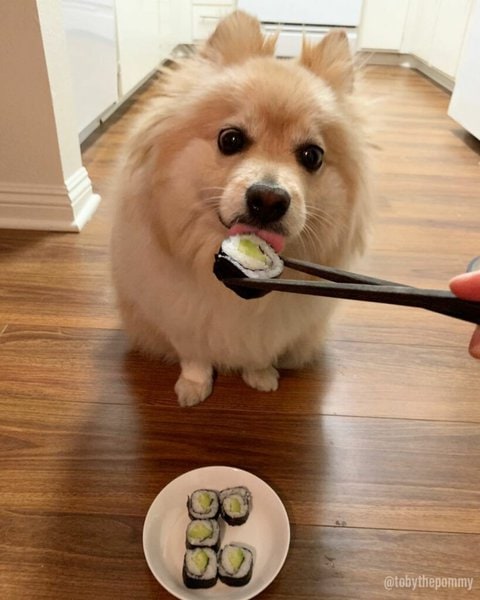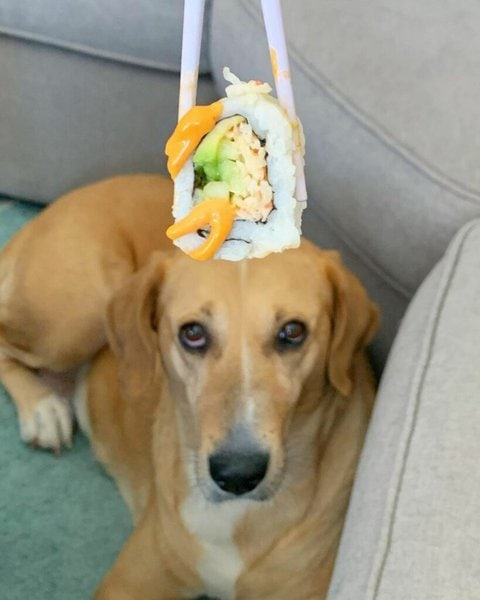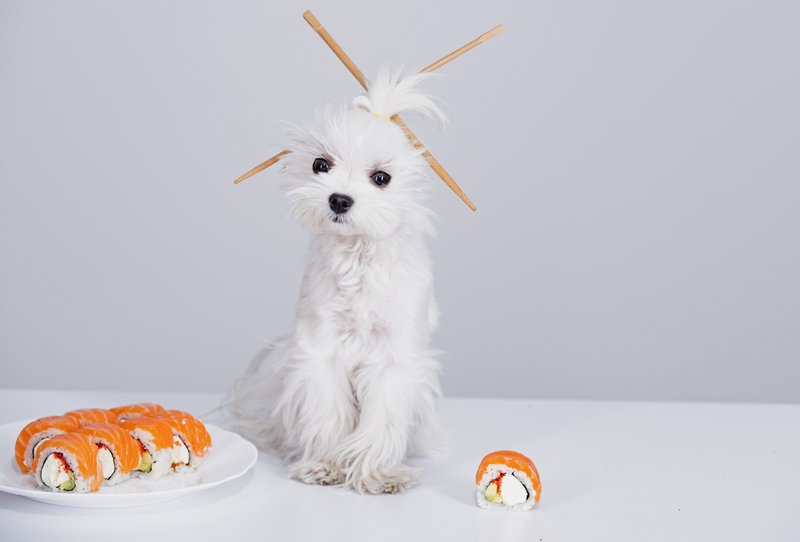There are many reasons to love sushi. One reason is that you receive the maximum nutritional value from the ingredients because of the minimal cooking involved in making sushi. While many people enjoy and benefit from eating sushi, what about our furry friends? Can dogs eat sushi?
Yes, dogs can eat certain kinds of sushi. However, avoid feeding dogs certain ingredients and always thoroughly cook meat before feeding dogs. Eating safe sushi types, like makizushi or maki, helps dogs’ overall health and body functioning.
While sushi can be a healthy snack for dogs, many concerned dog parents may worry about the uncooked ingredients. Fortunately, this article covers the healthy sushi varieties for your pooch and the safest ways to prepare sushi for doggies to enjoy. We also review the toxic ingredients to avoid feeding dogs. But before we do, let’s discuss how sushi affects our furry companions.
What Happens If A Dog Eats Sushi?

A dog may be unaffected but can become ill after eating certain kinds of sushi, depending on the ingredients and the quantity the dog eats per sitting.
If a dog eats sushi with unsafe ingredients, there is a high chance of their developing digestive problems, such as vomiting, diarrhea, and other symptoms. However, a tiny bit of sushi rarely hurts a dog.
Sushi with dog-friendly ingredients, such as vegetables and well-cooked meat or fish, provide dogs with essential vitamins and minerals, boosting their overall health.
What Should I Do If My Dog Eats Sushi?
If your dog eats sushi, monitor your furry friend closely for adverse reactions, such as lethargy, allergy symptoms, severe stomach aches, abnormal bowel movements, and drastic changes in energy.
Such reactions indicate some ingredients in the sushi are toxic to your dog. Therefore, if you notice these symptoms, immediately take your furry friend to the vet. However, if, after close observation, your dog shows no bad reaction to the snack, you shouldn’t worry.
Can Dogs Get Salmon Poisoning From Sushi?
Yes, dogs can get salmon poisoning from sushi with raw salmon filling.
Sushi with raw salmon filling increases your dog’s risk of salmon poisoning. This is because salmon often hosts the parasitic flatworm (fluke) Nanophyetes salmincola that transmits the bacteria-like organism Neorickettsia helminthoeca, causing salmon poisoning.
Avoid giving your dogs sushi with raw or undercooked fish fillings to reduce the chance of salmon poisoning.
What Kind Of Sushi Can Dogs Eat?

Dogs can eat some kinds of sushi with well-cooked ingredients. However, avoid feeding your canine pal non-fried food to reduce weight gain.
Certain sushi rolls make excellent treats for doggies. We recommend the following four types of sushi for dogs:
- Inarizushi
- Maki
- Temaki
- Uramaki
You can easily make these sushi rolls at home, customizing them by including dog-friendly ingredients. Let’s examine them in greater detail.
Inarizushi For Dogs
Inarizushi is rice packed inside tofu pouches, which is then deep-fried. The rice often contains sesame seeds, which are safe for dogs. Many vets also agree that tofu, which contains protein, is safe for dogs. When frying, use only dog-friendly oils such as coconut oil, sunflower oil, and other vet-approved vegetable oils.
Maki For Dogs
Maki or sushi maki is sushi with seaweed on the outside and rice and fillings on the inside. Some rolls also contain fish, raw veggies, and other spices. However, when cooking for Fido, use only cooked fish and dog-friendly vegetables, leaving out the spices.
Temaki For Dogs
Temaki consists of a large piece of roasted seaweed with some sushi rice, vegetables, and varieties of raw seafood. For your dog, ensure the seafood is well-cooked and non-fried. Also, ensure the rice filling is plain boiled and free of spices like vinegar, salt, and sugar.
Uramaki For Dogs
Uramaki is an inside-out rolled sushi. That means rice is outside the nori, and the fillings are inside. The outside rice can have toppings like sesame seed, which is nutritional and safe for dogs. Traditional uramaki has additional toppings like raw fish roes and slicings with avocado. However, don’t include these ingredients when feeding your four-legged companion.
Can Dogs Eat California Roll Sushi?
No, dogs can’t eat California roll sushi unless you substitute its potentially toxic ingredients.
California roll sushi is a variety of uramaki in which vinegared rice, not edible nori seaweed, forms the outside of the roll. Cucumbers, avocados, and crab meat make up the filling.
Dogs cannot eat avocados because it has several adverse effects on dogs, including vomiting, diarrhea, and myocardial damage. Also, crab, though not toxic, is a high source of iodine, which should not be over-secreted in your dog.
Can Dogs Eat Sushi Salmon?
No, dogs cannot eat sushi salmon because there is a high chance of poisoning from the fish.
Salmon sushi is salmon with rice rolled together in nori, dried seaweed. While the other ingredients are not necessarily toxic, the problem is the raw salmon used in this sushi.
Raw or undercooked salmon is unhealthy for your furry friend because it may host parasites like Neorickettsia helminthoeca, which causes salmon poisoning.
Since salmon poisoning can be fatal, leave salmon sushi off your furry friend’s menu.
Can Dogs Eat Sushi Tuna?

No, dogs cannot eat sushi tuna due to the risk of mercury poisoning.
Sushi tuna is sushi with tuna filling. Unfortunately, dogs can’t eat sushi with tuna because tuna has a higher mercury level than most other fish species.
As a result, abstain from giving your dog tuna sushi, whether the tuna is well-cooked or not. Studies reveal no cooking method can reduce the mercury levels in fish.
Can Dogs Eat Sushi Seaweed?
Yes, dogs can eat sushi seaweed, but only with safe seaweed, like nori.
Eating sushi seaweeds like nori can be highly beneficial to your canine friend because it is a rich source of calcium, copper, iron, magnesium, manganese, phosphorus, potassium, selenium, and zinc. The nori seaweed is vitamin-rich, too, with vitamins A, B, C, D, E, and K, as well as niacin, folic acid, and taurine.
Can Dogs Eat Sushi Crab?
No, dogs may not eat sushi with a crab-meat filling because crab is high in iodine.
Crab meat is lean and technically safe for your canine friend’s consumption. Moreover, crab is rich in minerals and vitamins that dogs need. However, its high iodine content is a cause of concern because it can cause your dog’s iodine secretion to rise beyond healthy levels.
High iodine increases dogs’ risk of developing hyperthyroidism, an extensive increase in metabolic rate characterized by weight loss, thirst, defecation, urination, and vomiting.
Can Dogs Eat Sushi Ginger?
No, dogs cannot eat sushi ginger because it contains potentially toxic ingredients like sugar and salt.
Sushi ginger is a type of Japanese pickle, or tsukemono, made by brining thin slices of young ginger in vinegar, sugar, and salt. As a result, the snack contains high salt and sugar, which is unhealthy for dogs. Besides, it is medically advisable for dogs to only have small amounts of ginger, so they should not eat sushi ginger as a snack.
How Much Sushi Can Dogs Eat?

When making sushi for dogs, follow the same process you would to make it for yourself. However, avoid spices and uncooked ingredients.
Dog-friendly sushi includes rice, roasted seaweed, and veggies like carrots, broccoli, and cucumbers. You will need one cup of plain-cooked rice, thoroughly cooked salmon filets, sliced peeled carrot, cucumber, and seaweed or nori paper.
The general rule for making sushi for dogs is to use only dog-friendly ingredients and cook ingredients thoroughly without frying in oil.
Here is how to make a typical dog sushi:
- Evenly spread a small quantity of cooked rice on nori paper, leaving a little space on one side.
- Thinly arrange the carrots and cucumbers with strips of the salmon filet at the center.
- Roll it up in the nori paper and pour some water on the edge.
- Seal it tight.
- Cut with a sharp knife into chunks your dogs can comfortably eat.
What Ingredients Are Dangerous For Dog Sushi?
Some common sushi ingredients that are not healthy for dogs include the following:
- Avocado: The fungicidal toxin persin causes digestive problems in dogs.
- Cream cheese: It contains excess fat and may cause weight gain, heart problems, and pancreatitis.
- Mango: The high sugar content can increase dogs’ glucose levels and cause obesity.
- Raw fish: There is a likelihood of salmon poisoning.
- Raw meat: There is a high chance that your dog can get a worm infection from eating raw meat.
- Wasabi: The Japanese spice can upset your furry friend’s digestive system.
Can Dogs Have Sushi With Soy Sauce?
No, dogs cannot have sushi with soy sauce because it contains high sodium.
Dogs eating soy sauce can cause excessive sodium absorption in their bodies since it contains more than the recommended daily sodium serving for pooches. Excess sodium can cause several health problems, including dehydration, muscle cramps, joint stiffness, and other signs of lethargy.





